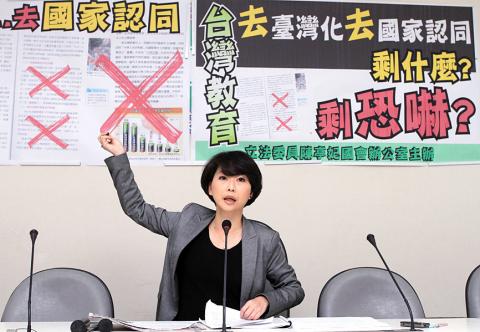The Democratic Progressive Party (DPP) yesterday again called for the Ministry of Education (MOE) to abolish its adjustment to the high-school curriculum and disclose the process of how the adjustment was made, as well as the complete list of members of the task force.
The party was referring to the ministry’s plan to revise the nation’s high-school curriculum. When the revisions are implemented in September next year at the beginning of the academic year, among the major changes will be the addition of the word “mainland” in references to China in Chinese-language history textbooks and the 50-year period of Japanese rule over Taiwan would be referred to as “Japanese colonial rule.”
The DPP said that it passed a resolution on Wednesday that the six DPP-governed cities and counties — Greater Kaohsiung, Greater Tainan, Yilan County, Yunlin County, Chiayi County and Pingtung County — would boycott the revised curriculum.

Photo: Wang Yi-sung, Taipei Times
Citing the “massive rather than slight” changes as attempting to do away with Taiwanese identity, DPP spokesperson Lin Chun-hsien (林俊憲) told a press conference that the ministry’s policy is “simply unacceptable.”
The party would collaborate with civic groups and academics to protest the revisions and pressure the ministry in the upcoming legislative session if it does not rescind the changes, Lin added.
Lin also cited the Administrative Procedure Act (行政程序法) when saying that the ministry had conducted the “hasty” review in secret and that it is legally bound to disclose the decisionmaking process of policy changes to the public.
Chiayi County Commissioner Helen Chang (張花冠) said the adjustment was proposed less than two years after the implementation of the current curriculum, four years shorter than the legally regulated implementation period of six years, and that it “betrays Taiwan-centered historical perspective and objective facts.”
Greater Kaohsiung Mayor Chen Chu (陳菊) urged the government to seek a consensus on the changes.
DPP Legislator Chen Ting-fei (陳亭妃) demanded that the ministry halt the policy, saying that the curriculum adjustment “has been more of a ‘de-Japanization’ and ‘de-Taiwanization’ than anything else.”
Minister of Education Chiang Wei-ling (蔣偉寧) does not respect Taiwan’s history, Chen told a press conference, adding that if Chiang wanted de-Taiwanization, he “might as well be China’s education minister.”
Additional reporting by CNA

The Ministry of Economic Affairs has fined Taobao NT$1.2 million (US$36,900) for advertisements that exceeded its approved business scope and ordered the Chinese e-commerce platform to make corrections in the first half of this year or its license would be revoked. Lawmakers have called for stricter supervision of Chinese e-commerce platforms and more stringent measures to prevent China from laundering its goods through Taiwan as US President Donald Trump’s administration cracks down on origin laundering. The legislature’s Finance Committee yesterday met to discuss policies to prevent China from dumping goods in Taiwan, inviting government agencies to report on the matter. Democratic Progressive Party

Taiwan and its Pacific ally Tuvalu on Tuesday signed two accords aimed at facilitating bilateral cooperation on labor affairs, according to Taiwan’s Ministry of Foreign Affairs (MOFA). The governments inked two agreements in Taipei, witnessed by Foreign Minister Lin Chia-lung (林佳龍) and visiting Deputy Tuvaluan Prime Minister Panapasi Nelesone, MOFA said in a news release. According to MOFA, the agreements will facilitate cooperation on labor issues and allow the two sides to mutually recognize seafarers’ certificates and related training. Taiwan would also continue to collaborate with Tuvalu across various fields to promote economic prosperity as well as the well-being of their

Taiwan would welcome the return of Honduras as a diplomatic ally if its next president decides to make such a move, Minister of Foreign Affairs Lin Chia-lung (林佳龍) said yesterday. “Of course, we would welcome Honduras if they want to restore diplomatic ties with Taiwan after their elections,” Lin said at a meeting of the legislature’s Foreign Affairs and National Defense Committee, when asked to comment on statements made by two of the three Honduran presidential candidates during the presidential campaign in the Central American country. Taiwan is paying close attention to the region as a whole in the wake of a

NEW WORLD: Taiwan is pursuing innovative approaches to international relations through economics, trade and values-based diplomacy, the foreign minister said Taiwan would implement a “three-chain strategy” that promotes democratic values in response to US tariffs, Minister of Foreign Affairs Lin Chia-lung (林佳龍) said. Taiwan would aim to create a “global democratic value chain,” seek to capitalize on its position within the first island chain and promote a “non-red supply chain,” Lin was quoted as saying in the ministry’s written report to the Legislative Yuan submitted ahead of the legislature’s Foreign Affairs and National Defense Committee meeting slated for today. The Ministry would also uphold a spirit of mutual beneficial collaboration, maintaining close communication and consultations with Washington to show that Taiwan-US cooperation